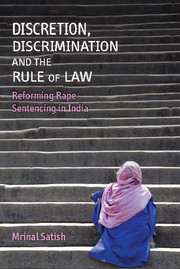Book contents
- Frontmatter
- Dedication
- Contents
- Acknowledgements
- Abbreviations
- 1 Introduction
- 2 An Introduction to the Indian Criminal Justice System
- 3 The Law and Practice of Rape Adjudication in India
- 4 Rape Sentencing: An Empirical Analysis
- 5 Myths and Stereotypes in Rape Prosecutions
- 6 Structuring Sentencing Discretion: Guideline Models and Approaches
- 7 Sentencing Discretion in India: The Need for Structuring
- 8 Sentencing Guidelines for Rape
- Appendix 1 List of Cases Studied for Empirical Analysis
- Appendix 2 Templates of Format Used for Medical Examination of Rape Victims
- Appendix 3 Overview of Variables Considered for Empirical Study and Data Obtained
- Appendix 4 Output of Regression Analysis
- Appendix 5 Charts
- Table of Cases
- Bibliography
- Index
4 - Rape Sentencing: An Empirical Analysis
Published online by Cambridge University Press: 23 July 2017
- Frontmatter
- Dedication
- Contents
- Acknowledgements
- Abbreviations
- 1 Introduction
- 2 An Introduction to the Indian Criminal Justice System
- 3 The Law and Practice of Rape Adjudication in India
- 4 Rape Sentencing: An Empirical Analysis
- 5 Myths and Stereotypes in Rape Prosecutions
- 6 Structuring Sentencing Discretion: Guideline Models and Approaches
- 7 Sentencing Discretion in India: The Need for Structuring
- 8 Sentencing Guidelines for Rape
- Appendix 1 List of Cases Studied for Empirical Analysis
- Appendix 2 Templates of Format Used for Medical Examination of Rape Victims
- Appendix 3 Overview of Variables Considered for Empirical Study and Data Obtained
- Appendix 4 Output of Regression Analysis
- Appendix 5 Charts
- Table of Cases
- Bibliography
- Index
Summary
Introduction
In the previous chapter, I argued that through its rape law jurisprudence the Supreme Court of India constructed stereotypes of rape victims and used such stereotypes to adjudicate rape cases. In this chapter, I shall demonstrate through an empirical study that stereotyping affects the sentencing phase as much as the guilt determination phase and is one of the causes of unwarranted disparity in sentencing. Additionally, I shall show that there are two other causes of disparity and arbitrariness in sentencing: first, inconsistency in the use and application of theories of punishment and, second, the consideration of irrelevant factors (concomitant with inconsistent consideration of relevant factors).
When I began work on this project, my understanding of the perceived problem with rape sentencing in India was based on anecdotal evidence. Reading a cross-section of rape judgments indicated unwarranted disparity in sentencing. Appellate courts regularly, but inconsistently, altered sentences imposed by lower courts on acquitted defendants. In fact, the Supreme Court of India has noted that there are major inconsistencies in sentencing and that extra-legal factors are taken into consideration while sentencing. The Government of India, and law reform committees set up by it, have called for enacting sentencing guidelines. In this chapter, I seek to determine whether there is a significant unwarranted disparity in sentencing and, if so, the causes of this disparity. In addition to case studies, I employ regression analysis to identify and analyse factors that affect sentencing in rape cases. The chapter begins with brief introduction followed by three major sections. Section II discusses sentencing jurisprudence (across all crimes) of the Supreme Court; in Section III, I examine the Supreme Court's jurisprudence in rape sentencing in particular; and in Section IV, I analyse rape sentencing by Indian courts, presenting the results of my empirical work.
Sentencing Jurisprudence of Indian Courts
How does a court determine the appropriate sentence for a convicted offender? This is a challenge that sentencing judges all over the world face on a daily basis. In India, judges have plenary discretion in imposing sentence anywhere up to the statutory maximum. Unlike in some countries, such as the United States, Indian sentencing judges do not receive the assistance of probation officers or have pre-sentence reports prepared for them.
- Type
- Chapter
- Information
- Discretion, Discrimination and the Rule of LawReforming Rape Sentencing in India, pp. 61 - 105Publisher: Cambridge University PressPrint publication year: 2016



